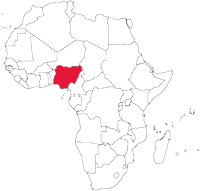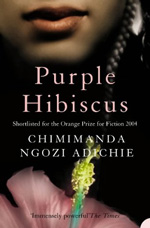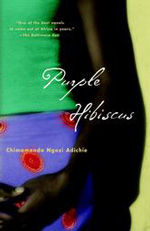
 Purple Hibiscus, published in 2003, was Chimamanda Adichie's debut novel. Although it was awarded the Commonwealth Writer's
prize for a first book, it was only when Half of a Yellow Sun won 2007's Orange Prize that readers flocked to Adichie's
first offering. Since then, Purple Hibiscus, like Adichie herself, has grown in reputation, and it is a book that has earned
its plaudits.
Purple Hibiscus, published in 2003, was Chimamanda Adichie's debut novel. Although it was awarded the Commonwealth Writer's
prize for a first book, it was only when Half of a Yellow Sun won 2007's Orange Prize that readers flocked to Adichie's
first offering. Since then, Purple Hibiscus, like Adichie herself, has grown in reputation, and it is a book that has earned
its plaudits.
Set in a deeply religious household in south-east Nigeria, it is the story of a family locked in a violent struggle to find their identity. In public the father, Eugene, is a well-known philanthropist and advocate for democracy. At home he is a violent tyrant, beating and torturing his children, Kambili and Jaja, in an attempt to keep them successful at school and devout in their beliefs. When they spend a week away from Eugene with their aunt, they become aware for the first time of the possibility of different forms of faith and identity. Kambili, Eugene's daughter, is unable to overcome her guilt about her brief glimpse of freedom, nor is she wholly able to overcome her desire for more. When they return to Eugene he senses the change in his children, precipitating a frightening escalation in the violence and shocking collapse of the life they had.
The themes explored in Purple Hibiscus are not unique to Adichie, but her brilliance with observing characters, deftness with language and subtlety with which she manipulates her readers' emotions make this a very special book. She keeps her focus tightly on the family, never losing sight of who they are as individuals. As readers, we want Kambili to rebel against her father, but she continues to love him and wants to please him, even as he nearly beats her to death. We want Eugene to be a monster, but he is, undeniably, a good man in many aspects, and his motives are as good as his actions are terrible. The narrow focus on the family means that Adichie can explore weighty issues such as African identity, domestic abuse and state sponsored violence without being overtly political or didactic. Instead we simply observe some brilliantly drawn characters living a life that routinely involves all of these things, and the book is all the more powerful because of it.
It seems remarkable that it is only eight years since the world first heard of Chimamanda Adichie. Half of a Yellow Sun may have become her most celebrated work, but Purple Hibiscus does not suffer in comparison. It is a book to savor and to admire.


Harper Perennial, paperback, 9780007189885
Anchor, paperback, 978-1400076949